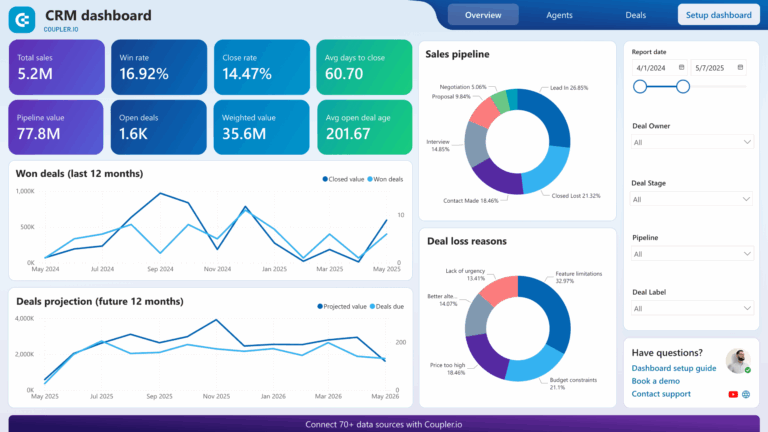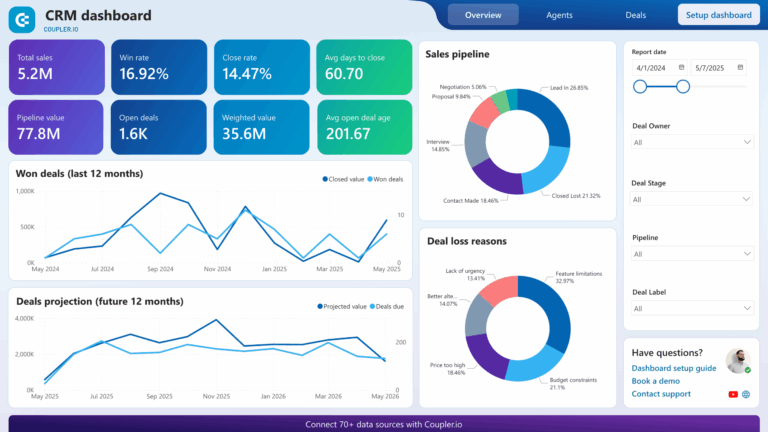The 5 Best Cryptocurrency Tax Calculators of 2025 (Reviewed)
Finding the Best Cryptocurrency Tax Calculator: An Introduction
Navigating the world of cryptocurrency taxes can be a daunting task for many investors. As the popularity of digital assets continues to soar, understanding the associated tax implications becomes increasingly critical. The challenge lies in accurately tracking transactions, calculating gains and losses, and ensuring compliance with the tax regulations in your jurisdiction. With a multitude of transactions often taking place across various exchanges and wallets, the need for a reliable cryptocurrency tax calculator is more pressing than ever.
This article aims to simplify your search by reviewing and ranking the best cryptocurrency tax calculators available online. Our goal is to save you time and effort by presenting a curated list of tools designed to streamline the tax reporting process. Whether you’re a casual trader or an active investor, finding a tool that meets your needs can make a significant difference in how you handle your crypto taxes.
In our evaluation, we considered several key criteria to ensure that we provide you with the most effective solutions. Accuracy is paramount; the calculators must deliver precise calculations based on real-time data and tax regulations. Ease of use is another crucial factor, as a user-friendly interface can greatly enhance the experience, especially for those who may not be tech-savvy. Lastly, we assessed the range of features offered, including integrations with exchanges, support for various transaction types (like staking and NFTs), and the ability to generate comprehensive tax reports.
By the end of this article, you’ll have a clearer understanding of which cryptocurrency tax calculator aligns best with your needs, allowing you to approach tax season with confidence.
Our Criteria: How We Selected the Top Tools
Key Criteria for Selecting Cryptocurrency Tax Calculators
When it comes to navigating the complexities of cryptocurrency taxation, choosing the right calculator can make a significant difference. Here are the essential criteria we considered when evaluating and selecting the top cryptocurrency tax calculators:
-
Accuracy and Reliability
– A good cryptocurrency tax calculator must provide accurate calculations based on current tax laws and regulations. It should handle various types of transactions—such as buying, selling, trading, staking, and airdrops—without errors. The tool should also update regularly to reflect any changes in tax legislation. -
Ease of Use
– User-friendliness is crucial, especially for those who may not be tech-savvy. The interface should be intuitive, enabling users to navigate the tool with ease. Simple steps for importing transaction data and generating tax reports are essential features that enhance usability. -
Key Features
– The best calculators should offer a range of essential features, including:- Integration Capabilities: Ability to connect with multiple exchanges and wallets for seamless transaction imports.
- Comprehensive Reporting: Options to generate various tax reports, such as Form 8949, capital gains reports, and income reports.
- Transaction Categorization: Automated categorization of transactions to help users understand their tax implications better.
- Tax-Loss Harvesting Tools: Features that identify opportunities to offset capital gains with losses.
-
Cost (Free vs. Paid)
– We evaluated the pricing models of each tool, considering both free and paid options. While some calculators offer basic services for free, others may provide more advanced features under a subscription model. Transparency in pricing and value for money were key factors in our assessment. -
Customer Support
– Effective customer support is vital for users who may have questions or encounter issues. The availability of live chat, email support, or comprehensive knowledge bases can significantly enhance the user experience. -
Compatibility with Different Jurisdictions
– Given the global nature of cryptocurrency trading, it is essential for a tax calculator to support various tax regulations across different countries. The ability to cater to users in multiple jurisdictions ensures that the tool is versatile and applicable to a wider audience. -
User Feedback and Reviews
– We considered user reviews and testimonials to gauge overall satisfaction with each calculator. Positive feedback regarding the tool’s performance and user support can be indicative of its reliability and effectiveness.
By using these criteria, we aimed to provide a well-rounded selection of cryptocurrency tax calculators that can assist users in managing their tax obligations efficiently and accurately.
The Best Cryptocurrency Tax Calculators of 2025
1. Free Crypto Tax Calculator
CoinLedger’s Free Crypto Tax Calculator is a user-friendly tool aimed at helping individuals estimate the tax implications of their cryptocurrency transactions. With a high rating of 4.8 from over 1,200 users, it focuses specifically on calculating the tax impact of crypto disposals, ensuring users can navigate their tax responsibilities with ease. This tool is particularly beneficial for those looking to simplify their crypto tax reporting without incurring any costs.
- Website: coinledger.io
- Established: Approx. 11 years (domain registered in 2014)
3. 9 Best Crypto Tax Software [2025]
Bitcoin.tax is a top-rated free crypto tax software ideal for individuals with fewer than 20 trades. It simplifies the tax filing process by generating essential IRS forms and integrates seamlessly with popular tax platforms like TurboTax, TaxACT, and H&R Block. This user-friendly tool is designed to help users accurately report their cryptocurrency transactions while ensuring compliance with tax regulations, making it an excellent choice for casual traders.
- Website: bitbo.io
- Established: Approx. 5 years (domain registered in 2020)
4. Koinly: Free Crypto Tax Software
Koinly is a free cryptocurrency tax software designed to streamline the process of calculating and reporting crypto taxes. It offers features that help users accurately assess their tax obligations while identifying strategies to minimize future taxes. Available in over 20 countries, Koinly supports essential tax forms like Form 8949 and Schedule D, making it a reliable choice for individuals navigating the complexities of crypto taxation.
- Website: koinly.io
- Established: Approx. 7 years (domain registered in 2018)
5. Cryptocurrency Tax Calculator 2024
The Cryptocurrency Tax Calculator by NerdWallet is designed to help users accurately calculate taxes owed on crypto transactions for the 2024 tax year, with payments due in 2025. Key features include the ability to input the purchase and sale prices of cryptocurrencies, enabling users to assess their capital gains or losses efficiently. This tool is essential for anyone looking to navigate the complexities of cryptocurrency taxation with ease and precision.
- Website: nerdwallet.com
- Established: Approx. 16 years (domain registered in 2009)
How to Get the Most Accurate Results
Double-Check Your Inputs
When using a cryptocurrency tax calculator, the accuracy of the results heavily relies on the data you input. Ensure that you carefully enter your transaction history, including dates, amounts, and types of transactions (e.g., buying, selling, staking). Many calculators allow you to import data directly from exchanges or wallets, which can reduce the risk of human error. However, it’s still wise to verify that all transactions have been accurately recorded and categorized. Any discrepancies in your input can lead to significant errors in your tax calculations.
Understand the Underlying Assumptions
Different calculators may use varying methods to calculate taxes, especially regarding capital gains and losses. Familiarize yourself with how your chosen tool interprets transactions, such as whether it applies FIFO (First In, First Out) or LIFO (Last In, First Out) methods for calculating gains. Understanding these assumptions will help you interpret the results accurately and ensure that they align with your own tax strategy. Review any documentation or FAQs provided by the calculator to grasp its methodologies better.
Use Multiple Tools for Comparison
To ensure that you are getting the most accurate results, consider using multiple cryptocurrency tax calculators. Each tool might have its strengths and weaknesses, and by comparing results, you can identify any discrepancies. For instance, if one calculator suggests a significantly different tax liability than another, it may warrant further investigation. This approach not only provides a safety net but can also give you insights into different perspectives on your tax situation.
Stay Updated on Tax Regulations
Tax regulations surrounding cryptocurrency can change frequently. Ensure that the calculator you are using is updated to reflect the latest laws and guidelines specific to your country. Many calculators offer resources or blog sections that discuss changes in tax legislation. Keeping abreast of these updates will help you make informed decisions and avoid potential pitfalls.
Keep Detailed Records
Maintaining thorough documentation of all your cryptocurrency transactions can significantly enhance the accuracy of your tax calculations. This includes not just the trades you make but also any airdrops, staking rewards, or losses incurred. Good record-keeping will provide a robust foundation for your calculations and will be invaluable if you ever face an audit. Many calculators allow you to upload or integrate your transaction history for easier management, but having your records organized will always be beneficial.
Consult a Tax Professional
While online calculators can provide a good estimate of your tax obligations, consulting with a tax professional who understands cryptocurrency can offer personalized advice. A professional can help you navigate complex situations, ensure compliance with local regulations, and potentially identify tax-saving strategies that automated tools might overlook. This collaboration can enhance the accuracy of your tax filings and provide peace of mind during tax season.
By following these guidelines, you can maximize the effectiveness of cryptocurrency tax calculators and ensure that your tax reporting is as accurate and compliant as possible.
Frequently Asked Questions (FAQs)
1. How is cryptocurrency tax calculated in the United States?
Cryptocurrency tax in the United States is generally categorized into two types: capital gains tax and income tax. If you sell or trade cryptocurrency, you may incur capital gains tax on any profits made, calculated based on the difference between your purchase price and the selling price. Additionally, if you earn cryptocurrency through activities like staking or mining, that income is subject to regular income tax. It’s important to keep accurate records of all transactions, as the IRS requires detailed reporting.
2. Do I need to pay taxes if I lost money trading cryptocurrency?
Yes, you may still have tax obligations even if you experienced losses in your cryptocurrency trading. In many jurisdictions, taxes are assessed based on realized gains or losses at the time of each transaction, not on your overall profit or loss for the year. However, you might be able to use your losses to offset gains in other areas or carry them forward to future tax years, potentially reducing your overall tax burden.
3. Can a cryptocurrency tax calculator help with crypto-to-crypto transactions?
Absolutely! A cryptocurrency tax calculator can simplify the process of calculating taxes on crypto-to-crypto transactions. When you trade one cryptocurrency for another, the calculator will help you determine the fair market value of the assets at the time of the transaction. This is crucial for accurately reporting capital gains or losses, as it helps you track the value of both cryptocurrencies involved in the trade.
4. How does a cryptocurrency tax calculator work?
Most cryptocurrency tax calculators operate by allowing users to import their transaction history from various exchanges and wallets. After importing, the tool categorizes each transaction, calculates realized profits and losses, and generates comprehensive tax reports suitable for your accountant or tax filing. Some calculators also offer features like tax-loss harvesting, which can help you optimize your tax situation by identifying opportunities to offset gains with losses.
5. Can I use a cryptocurrency tax calculator if I have non-exchange activity?
Yes, many cryptocurrency tax calculators are designed to handle non-exchange activities, such as staking, mining, airdrops, and other DeFi transactions. These tools typically include categorization features that allow you to input various types of transactions, ensuring that all your crypto activities are accounted for when calculating your tax obligations. This comprehensive approach helps you maintain accurate records and ensures compliance with tax regulations.
Important Disclaimer
⚠️ Important Disclaimer
The information and reviews in this guide are for educational purposes only and are based on publicly available information. We are not affiliated with any of the tools mentioned. Features and pricing may change. Always conduct your own research before choosing a tool for your needs.

![Screenshot of 9 Best Crypto Tax Software [2025] - Bitbo](https://www.cify.info/wp-content/uploads/2025/09/bitbo-io-screenshot-9297.jpg)






